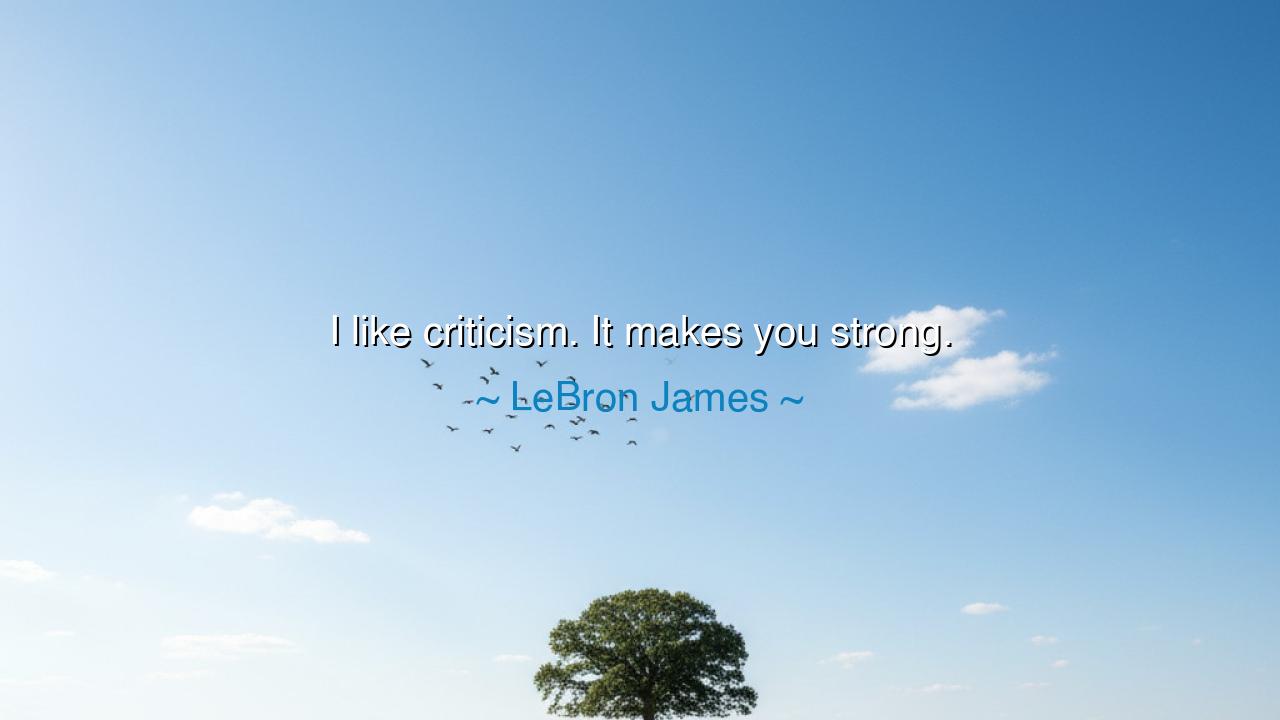
I like criticism. It makes you strong.






LeBron James, titan of the court and student of life, once declared with a warrior’s calm: “I like criticism. It makes you strong.” These words carry the weight of a man who has stood before millions, praised and mocked, lifted high and cast down, and yet risen greater each time. Within this short utterance lies an eternal teaching: that the fire of criticism is not meant to destroy, but to temper; not to humiliate, but to harden the spirit into unshakable strength.
To embrace criticism is to embrace the whetstone upon which the blade of the soul is sharpened. The weak shrink before rebuke, for it exposes their wounds. But the strong welcome it, knowing that only through correction and opposition does growth take root. Just as iron must endure hammer and flame to become steel, so must a human being endure the harsh words and judgments of others to become more resolute, more aware, more alive. Thus, criticism, though painful, is the silent teacher of greatness.
When LeBron speaks, he speaks from the crucible of experience. From the time he was a teenager, hailed as “The Chosen One,” he bore the crushing weight of expectation. Every missed shot, every lost game, every stumble was magnified by critics eager to see him fall. Yet instead of being broken, he turned those voices into fuel. Each jeer became a challenge, each doubt a stone upon which to build. Through this trial he discovered the truth: criticism does not weaken those who face it—it forges them into giants.
History echoes this lesson in the life of Abraham Lincoln. Before he became the revered president, Lincoln faced a torrent of criticism: failures in business, defeats in elections, mockery of his appearance, doubts about his ability. Lesser men might have crumbled under such relentless assault. Yet Lincoln bore it with humility, using each failure as a teacher, each insult as a spur to endurance. In time, he rose as a leader not in spite of criticism, but because of it. His strength was forged in the furnace of rejection and opposition.
It is important, too, to see the difference between destructive cruelty and constructive criticism. The wise learn even from their enemies, for even malice may contain a grain of truth. The strong do not waste energy in resentment; they sift through the words of others and claim the wisdom that lies hidden within. To reject all criticism is to blind oneself to one’s own weakness. To welcome it is to become unassailable, for you have turned the weapons of others into armor for yourself.
The lesson, then, is clear: do not flee from criticism. Do not curse it or despise it. Instead, thank it, for it reveals the path to growth. The athlete who trains only in comfort never reaches greatness; the warrior who faces no opponent forgets his art. Likewise, the spirit that hears no rebuke grows arrogant and frail. But the spirit that welcomes rebuke, weighs it, and learns from it grows ever stronger, until no blow can shatter it.
Practically, this means: when others criticize you, listen first, defend later. Write down the words, even when they sting, and ask yourself, “What lesson lies here for me?” Seek mentors who will be honest, not flattering. Surround yourself with those unafraid to point out your flaws. And most of all, do not fear the jeers of the crowd, for they are but the chorus that sings while you climb your mountain. Let their words drive you, not destroy you.
So let us remember LeBron’s wisdom: criticism makes you strong. It is not your enemy, but your ally in disguise. Receive it, endure it, and transform it into power. For the one who learns to draw strength from criticism cannot be defeated—not by failure, not by insult, not even by the weight of the world. Such a one rises, unbroken, like the oak that grows taller for every storm it has endured.






AAdministratorAdministrator
Welcome, honored guests. Please leave a comment, we will respond soon